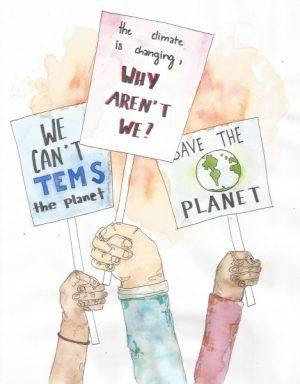Tulane must take forceful stand to combat climate crisis

Lucy Murray is a senior studying Environmental Biology and a member of Citizens’ Climate Lobby.
In 2014, Tulane came out with a Climate Action Plan that set a goal of a 15% reduction in greenhouse gas emissions by 2020 and carbon neutrality by 2050. It’s time Tulane started keeping its promises.
To continue pushing for these reductions, Divest Tulane is participating in one of many Global Climate Strikes on Friday, Sept. 20, in Pocket Park, with Tulane- and Louisiana-specific demands outlined. Among these are the demands that Tulane divests its endowment from fossil fuels and become carbon neutral by 2035.
Truth. Millions of people across the globe are taking to the streets this Sept 20/27th, demanding for climate justice. Your support matters. Join the #ClimateStrike in your nearest city. pic.twitter.com/3gdLNirHAK
— Amnesty International (@amnesty) September 18, 2019
These demands are not too radical – the Intergovernmental Panel on Climate Change stated in 2018 that, to maintain a global temperature increase less than 1.5 degrees Celsius, we need to reduce global emissions by 45% by 2030 and be at net zero emissions by 2050.
But the Tulane administration does not need to hear this. At a strong research institution like Tulane, we understand better than most the impact that climate change is having on the environment, human health and the economy. More importantly, Tulane’s administration definitely knows the bold levels of action required to curb its effects before it’s too late.
Students have been asking for divestment, composting, better recycling infrastructure and more for years, and it seems like the response is always the same: it’s too difficult because of bureaucracy and/or money.
Today, meteorologists & climate scientists around the World are raising awareness about #ClimateChange by showing their warming stripes to highlight the rise in global temperatures. #ShowYourStripes too >> https://t.co/E7Se8xD1cD
Some versions by our followers
#SB50Bonn pic.twitter.com/nAlJvihPYh
— UN Climate Change (@UNFCCC) June 21, 2019
This is understandable — it is difficult to make sweeping structural changes to an institution, especially ones that involve some money loss. But it’s also difficult to exist in the middle of an unprecedented climate apocalypse, doing everything you can as an individual to reduce your impact, yet having to watch institutions which are the larger contributors to climate change not take actions they know could help address the problem.
The most disturbing part of this deliberate inaction is that, in saying it is “too difficult” to take these actions, they send the message that letting the world descend into irreparable damage is less difficult than taking necessary preventative steps.
So after the climate strike on Friday, the Tulane administration must demonstrate real action. This time, it doesn’t need to commend students for their passion about the cause or for their involvement in politics. It doesn’t need to remind us of the great sustainability strides Tulane has made with the OZZI container program, LEED-certified buildings or Climate Action Week.
This time, Tulane needs to make the “difficult” decision of committing to hard-hitting and necessary climate change action. It is time to become a university that decides to boldly lead in doing what everyone knows is the only thing we can do to hold off the most catastrophic effects of climate change: becoming carbon neutral by 2050.
Your donation will support the student journalists of Tulane University. Your contribution will allow us to purchase equipment and cover our annual website hosting costs.



Betty Lowell • Sep 22, 2019 at 6:24 am
Tulane is a place to buckle down and get a good education. Global warming or the new climate change agenda takes time away from focus on studies. Less partying, less drinking, and more nose in the books! Best wishes students!